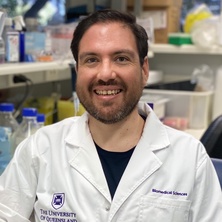
Overview
Background
Dr. Albornoz is an early career researcher who has training in neuroscience, immunology, and pharmacology. Prior to migrating to Australia, he completed a bachelor's in Biochemistry followed by a master’s degree in Chile, he then gained experience working in Chile as a research assistant in the Millennium Institute for Immunology and Immunotherapy, focusing on neurodegeneration and the immune response in the context of Multiple Sclerosis. Later, he was awarded a UQ international scholarship to undertake a Ph.D. at the Institute for Molecular Biosciences (IMB), under the supervision of Prof Matt Cooper, his Ph.D. project has assisted in the development of next-generation NLRP3 inflammasome inhibitors, and to validate NLRP3 as a druggable therapeutic target for Parkinson’s disease. He completed his Ph.D. in 2019 and continued his post-doctoral research studies under the supervision of Prof Trent Woodruff. A key focus of his current work is testing novel drugs in preclinical models and understanding the role of the peripheral innate immune response in neurodegenerative diseases including motor neuron disease (amyotrophic lateral sclerosis), Huntington's disease, and Parkinson's disease.
Availability
- Dr Eduardo Albornoz Balmaceda is:
- Available for supervision
- Media expert
Fields of research
Qualifications
- Masters (Research) of Biochemistry, Universidad Andrés Bello
- Doctor of Philosophy of Neurosciences, The University of Queensland
Works
Search Professor Eduardo Albornoz Balmaceda’s works on UQ eSpace
2017
Journal Article
The ketone body β-hydroxybutyrate does not inhibit synuclein mediated inflammasome activation in microglia
Deora, Vandana, Albornoz, Eduardo A., Zhu, Kevin, Woodruff, Trent M. and Gordon, Richard (2017). The ketone body β-hydroxybutyrate does not inhibit synuclein mediated inflammasome activation in microglia. Journal of Neuroimmune Pharmacology, 12 (4), 1-7. doi: 10.1007/s11481-017-9754-5
2017
Conference Publication
Gestational hypothyroxinemia increases the immune response of the progeny that suffers experimental autoimmune encephalomyelitis
Opazo, Maria Cecilia, Bugueño, Katherinne, Jara, Evelyn, Haensgen, Henny, Albornoz, Eduardo, Gomez, Felipe, Binzberger, Rebecca, Toledo, Paola, Blanco, Noelia, Simon, Felipe, Elorza, Alvaro, Kalergis, Alexis, Bueno, Susan and Riedel, Claudia (2017). Gestational hypothyroxinemia increases the immune response of the progeny that suffers experimental autoimmune encephalomyelitis. Immunology 2017™ Meeting, Washington, DC United States, 12-16 May 2017. Rockville, MD United States: American Association of Immunologists. doi: 10.4049/jimmunol.198.supp.207.8
2017
Conference Publication
Gut microbiome changes induced by experimental trichuris muris infection are associated with decreased cognitive function in mice
Magalhaes, Ricardo J. Soares, Giacomin, Paul, Sarnyay, Zoltan, Kraeuter, Ann, Urich, Tim, Bengtsson, Mia, Jin, Shuting, Albornoz, Eduardo A., Gordon, Richard and Woodruff, Trent (2017). Gut microbiome changes induced by experimental trichuris muris infection are associated with decreased cognitive function in mice. 65th Annual Meeting of the American-Society-of-Tropical-Medicine-and-Hygiene (ASTMH), Atlanta, GA, United States, 13-16 November 2016. Deerfield, United States: American Society of Tropical Medicine and Hygiene.
2016
Conference Publication
Complement C5a activates microglial NLRP3 inflammasomes and drives neurodegeneration in Parkinson's disease through C5aR1
Gordon, Richard, Albornoz, Eduardo A., Kumar, Vinod, Zhou, Kiane, Garin-Michaud, Ashoka, Mantavani, Susanna, Kanthasamy, Anumantha G. and Woodruff, Trent M. (2016). Complement C5a activates microglial NLRP3 inflammasomes and drives neurodegeneration in Parkinson's disease through C5aR1. The XXVI International Complement Workshop (ICW), Kanazawa, Japan, 4-8 September 2016. Muenchen, Germany: Elsevier. doi: 10.1016/j.imbio.2016.06.146
2015
Journal Article
Gestational hypothyroidism increases the severity of experimental autoimmune encephalomyelitis in adult offspring (vol 23, pg 1627, 2013)
Albornoz, E. A., Carreno, L. J., Cortes, C. M., Gonzalez, P. A., Cisternas, P. A., Cautivo, K. M., Catalan, T. P., Opazo, M. C., Eugenin, E. A., Berman, J. W., Bueno, S. M., Kalergis, A. M. and Riedel, C. A. (2015). Gestational hypothyroidism increases the severity of experimental autoimmune encephalomyelitis in adult offspring (vol 23, pg 1627, 2013). Thyroid, 25 (9), 1068-1068. doi: 10.1089/thy.2012.0401.cxn
2015
Journal Article
Excess iodide induces an acute inhibition of the sodium/iodide symporter in thyroid male rat cells by increasing reactive oxygen species
Arriagada, Alejandro A., Albornoz, Eduardo, Cecilia Opazo, Ma., Becerra, Alvaro, Vidal, Gonzalo, Fardella, Carlos, Michea, Luis, Carrasco, Nancy, Simon, Felipe, Elorza, Alvaro A., Bueno, Susan M., Kalergis, Alexis M. and Riedel, Claudia A. (2015). Excess iodide induces an acute inhibition of the sodium/iodide symporter in thyroid male rat cells by increasing reactive oxygen species. Endocrinology, 156 (4), 1540-1551. doi: 10.1210/en.2014-1371
2015
Conference Publication
Paraquat activates the NLRP3 Inflammasome in microglia via the NADPH oxidase pathway
Albornoz, E., Deora, V., Robertson, B. A., Cooper, M. A., Schroder, K., Woodruff, T. M. and Gordon, R. (2015). Paraquat activates the NLRP3 Inflammasome in microglia via the NADPH oxidase pathway. International Congress of Immunology (ICI), Melbourne, Australia, Aug 21-26, 2016. Weinheim, Germany: Wiley-Blackwell.
2013
Journal Article
Gestational hypothyroidism increases the severity of experimental autoimmune encephalomyelitis in adult offspring
Albornoz, Eduardo A., Carreno, Leandro J., Cortes, Claudia M., Gonzalez, Pablo A., Cisternas, Pablo A., Cautivo, Kelly M., Catalan, Tamara P., Cecilia Opazo, M., Eugenin, Eliseo A., Berman, Joan W., Bueno, Susan M., Kalergis, Alexis M. and Riedel, Claudia A. (2013). Gestational hypothyroidism increases the severity of experimental autoimmune encephalomyelitis in adult offspring. Thyroid, 23 (12), 1627-1637. doi: 10.1089/thy.2012.0401
Supervision
Availability
- Dr Eduardo Albornoz Balmaceda is:
- Available for supervision
Looking for a supervisor? Read our advice on how to choose a supervisor.
Supervision history
Current supervision
-
Doctor Philosophy
Therapeutic blockade of neuroinflammation for the treatment of Huntington's disease
Associate Advisor
Other advisors: Dr John Lee, Professor Trent Woodruff
Media
Enquiries
Contact Dr Eduardo Albornoz Balmaceda directly for media enquiries about:
- C5aR
- Complement system
- Drug discovery
- Immunology
- Infectious disease and brain
- Inflammasomes
- Long COVID
- Microglia
- Neuroimmunology
- Neuroinflammation
- Neuroscience
- NLRP3
- Parkinson's disease
Need help?
For help with finding experts, story ideas and media enquiries, contact our Media team:
